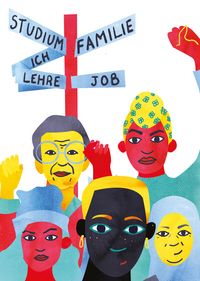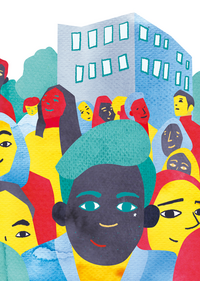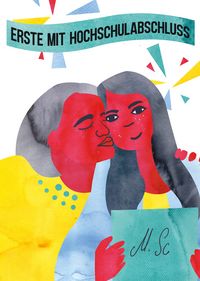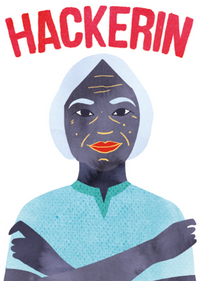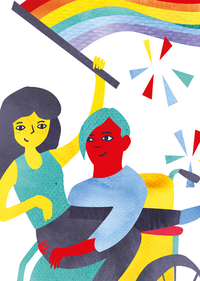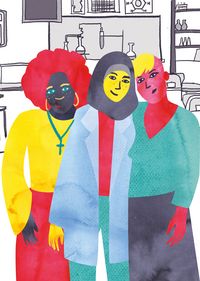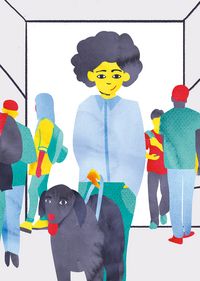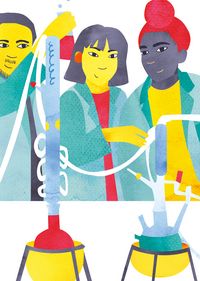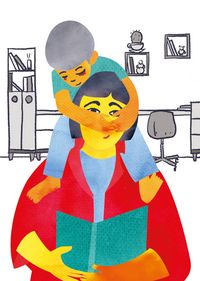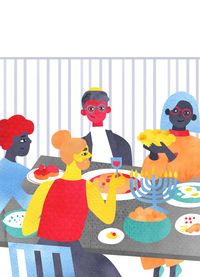Anti-Discrimination and diversity-sensitive University
Together with the artist Janna Baibatyrova, the Gender and Technology Centre (GuTZ) has created postcards on the subject of anti-discrimination. They deal with individual categories such as age, disability, gender or parenthood. The postcards are intended to heighten the awareness of people to whom the topic of anti-discrimination is still completely new, and to encourage them to reflect on it.
All postcards can be ordered from us on request and free of charge.
If you have any questions, comments or criticism regarding the motifs or the texts, please do not hesitate to contact us: gutz[at]bht-berlin.de.
Intersectionality
Text on the back: There are various social categories which are often accompanied by discrimination, e.g. gender, age, parenthood, religion and belief, social background, disability, ethnicity, anti-Semitism or sexual orientation. The concept of intersectionality makes visible that these categories overlap and are intertwined. There are people who are affected by several forms of discrimination at the same time and thus are often more disadvantaged in several areas of life than others. For example, only very few female professors of colour teach at German universities, while white men are much more strongly represented.
Gender
Text on the back: At birth, we are assigned a biological sex ("male" or "female") based on certain physical characteristics. If these characteristics are ambiguous, we speak of intersexuality.
The social gender is determined by social attributions and ideas of what being a woman or a man within a mostly binary gender system means. People who do not feel they belong to either of these two genders describe themselves as "non-binary". Those who feel they belong to a gender other than the one assigned at birth call themselves "trans".
Since 2013, it has been possible to decide freely not to make an entry in the civil status register at birth or to have it deleted subsequently. Since 2018, there has been the so-called "third option" in Germany. Under certain conditions, it is possible to choose the gender entry "diverse" ("d").
Social Background
Text on the back: Follow your dream! If I made it, you can make it too!
Statements like these conceal the fact that it is only partly within our power to shape our own path in life. Our school-leaving qualifications, circle of friends or choice of career are influenced by our social background. The environment into which we are born influences how we speak, act, think and thus also which opportunities are open to us. Discrimination based on social background is often subliminal and rarely visible at first glance.
Age
Text on the back: "Young people have no sense of responsibility."
"Old people can't handle the PC."
Behind the attributions "too young" or "too old" there are often prejudices that young people are inexperienced and older people are inflexible. Ageism means the social and/or economic discrimination of persons and groups because of their age. In addition to different salaries, this can be seen, for example, in a lack of access to further education and training opportunities, or in a lack of appreciation for each other. It also influences other areas of life, including who we find attractive.
Sexual Identity
Text on the back: Lesbian, gay and bi â these are just a few examples of the diversity of sexual identities. Queer is sometimes used as an umbrella term for sexual and gender diversity. However, despite the increasing visibility of diverse sexual identities, heterosexuality continues to be presented as the social norm.
People from the LGBTI* community (lesbian, gay, bisexual, trans, inter, etc.) still face discrimination today. This manifests itself, for example, in the use of queer-hostile swear words, discrimination in everyday life and even violence.
Religion and Belief
Text on the back: Five people, five views?
In our everyday lives, we encounter many people with different religions and worldviews. These are particularly protected by the Basic Constitutional Law (Articles 3 and 4), which states that people may not be disadvantaged on the basis of (ascribed) religious affiliation or ideological conviction. Such disadvantages are, for example, more difficult access to universities or bans on assemblies. Instead, people are allowed to freely express their convictions and meet for this purpose in a common place.
Disability
Text on the back: Whether in a seminar, at work or in everyday life: people with impairments often encounter barriers. Disabilities arise from the interaction between societal barriers and a person's physical and/or mental impairments. Inclusion within institutions means adapting existing structures to meet different needs. For example, a person with dyslexia might need more time in an exam, and rooms have to be barrier-free to make equal participation easier for everyone.
Ethnicity
Text on the back: We often have ideas about what is meant by the term ethnicity. However, these are never neutral, but contain ethnicising attributions. People are assigned to a certain ethnicity because of their origin, their appearance or their habits. Such attributions are racist, even if they often take place unconsciously.
Racism is not only limited to the interpersonal level, but permeates all areas of our society. One reason for this is that Germany has hardly dealt critically with its colonial history. To this day, streets and institutions are named after people who actively contributed to colonial oppression.
Parenthood
Text on the back: As a single parent? As a couple? As a community?
Parenthood means responsibility and is influenced by many factors. Because children have different needs at different times, parents need flexible arrangements. They have to be able to reconcile various areas of life such as their studies, job, free time and family. In addition, the division of labour with regard to children and household is unequally distributed in many families. A family-friendly organisation or institution must take all this into account.
Anti-Semitism
Text on the back: Anti-Semitism refers to all forms of hatred and hostility towards Jews. In anti-Semitic thinking, Jewish people are not perceived as individuals, but only as a group to which various characteristics are attributed. The motives behind these attributions may be religious, racist or economic. Even attributes that might seem positive at first glance, such as particular cleverness, are anti-Semitic. Anti-Semitism is often linked to conspiracy theories and then usually involves the imagining of a âsuperiorâ Jewish person. This is another reason why anti-Semitism should not be addressed as a singular phenomenon, but as a problem for society as a whole.

